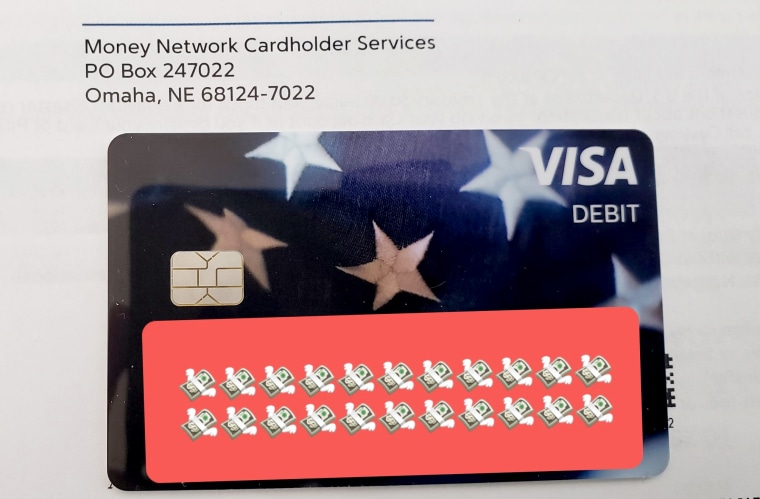Some Americans may be unwittingly throwing their long-awaited stimulus payments in the trash. That's because, starting last week, the Treasury Department and the IRS started sending out economic impact payments in regular white envelopes that could be confused for junk mail.
While some people have already received their payments as direct deposits or paper checks in the mail, almost 4 million people — including those for whom the agency does not have bank accounts on file — will be getting their stimulus payments in the form of prepaid debit cards. The only problem is that the debit cards come in envelopes that say "Money Network Cardholder Services" and do not bear any federal markings.
That has prompted some recipients to complain that they look too similar to unwanted credit card offers, leading some to accidentally throw the cards — which could contain as much as $3,400 for a family of four — in the trash.
"I had not heard of this but I just got my covid stimulus money via a debit card? I was hella suspicious at first cause I knew nothing about this but I researched it and it's legit... and it actually has money on it," valerieflames tweeted.
Politico editor Zack Stanton tweeted: "I almost threw mine out with the junk mail: The return address was 'Money Network Cardholder Services,' no indication it's from the govt/U.S. Treasury. Inside that envelope? A debit card from the govt with $2,400 on it."
Bonnie Moore of Florida told WINK-TV of Fort Myers: "My husband looked at it, briefly read it, and he said, 'Do you want this?' And I said, 'I don't need another fake card,' so he cut it up in little pieces. The next thing you see is I am in the garbage can trying to pull out all of the pieces together, which did not work."
To help taxpayers identify the cards, the IRS said in an FAQ that they will bear the Visa logo and are issued by MetaBank. A letter included with the cards explains that they are the Economic Impact Payment Card. More information is available at eipcard.com.
To activate the cards, taxpayers need to call 1-800-240-8100 to verify their identities and set their PINs. They should also sign the backs of their cards.
The cards can then be used like regular debit cards for online transactions or swiped at stores, where users can also opt for cash back.
Other parts of the federal government seemed to have realized that the payment and the letter could be confusing.
"I received an Economic Impact Payment VISA prepaid debit card from the government in the mail. Is this a scam?" is one of the FAQ items posted on the website of the Consumer Financial Protection Bureau.
"This is not a scam. The government is sending some people Economic Impact Payment Cards if they qualified for a stimulus payment and the IRS couldn't direct deposit the payment," the site continues.
Full coverage of the coronavirus outbreak
The card can be used free — but some optional services can incur fees, including a $2 withdrawal fee after the first withdrawal, 25 cents for a balance inquiry and $5 for more than one in-person withdrawal. No more than $1,000 can be withdrawn from an ATM in one day.
Taxpayers who want to pay their rent with the cards should check with their landlords to find out whether they have the means to accept electronic payments or use apps such as Venmo or Zelle.
Anyone who needs to have a paper check generated can call the above customer service number and request that a "Money Network Check" be mailed. After it arrives, they should fill out the date, the dollar amount and the payee but then must call again to have the check activated.

